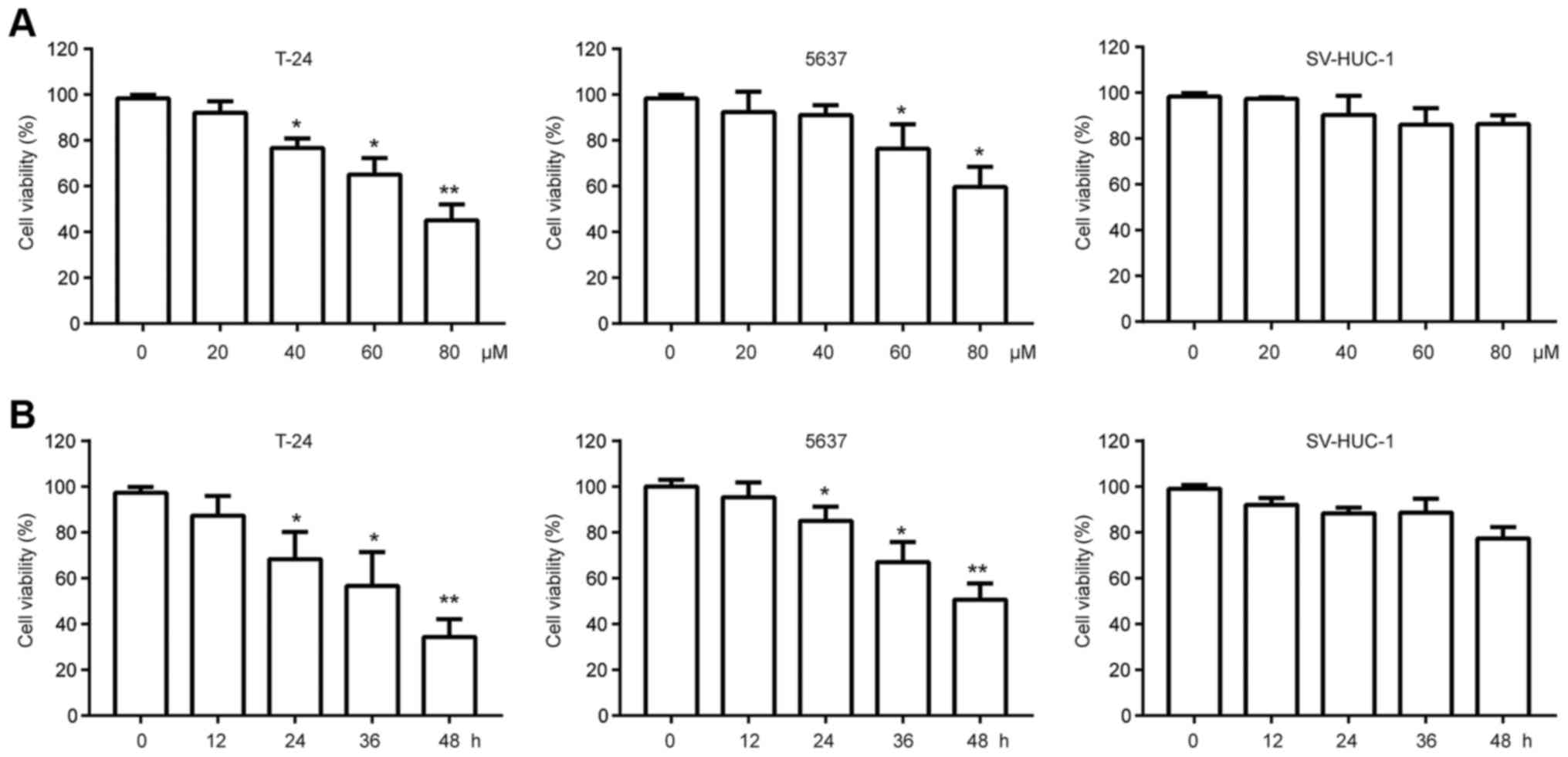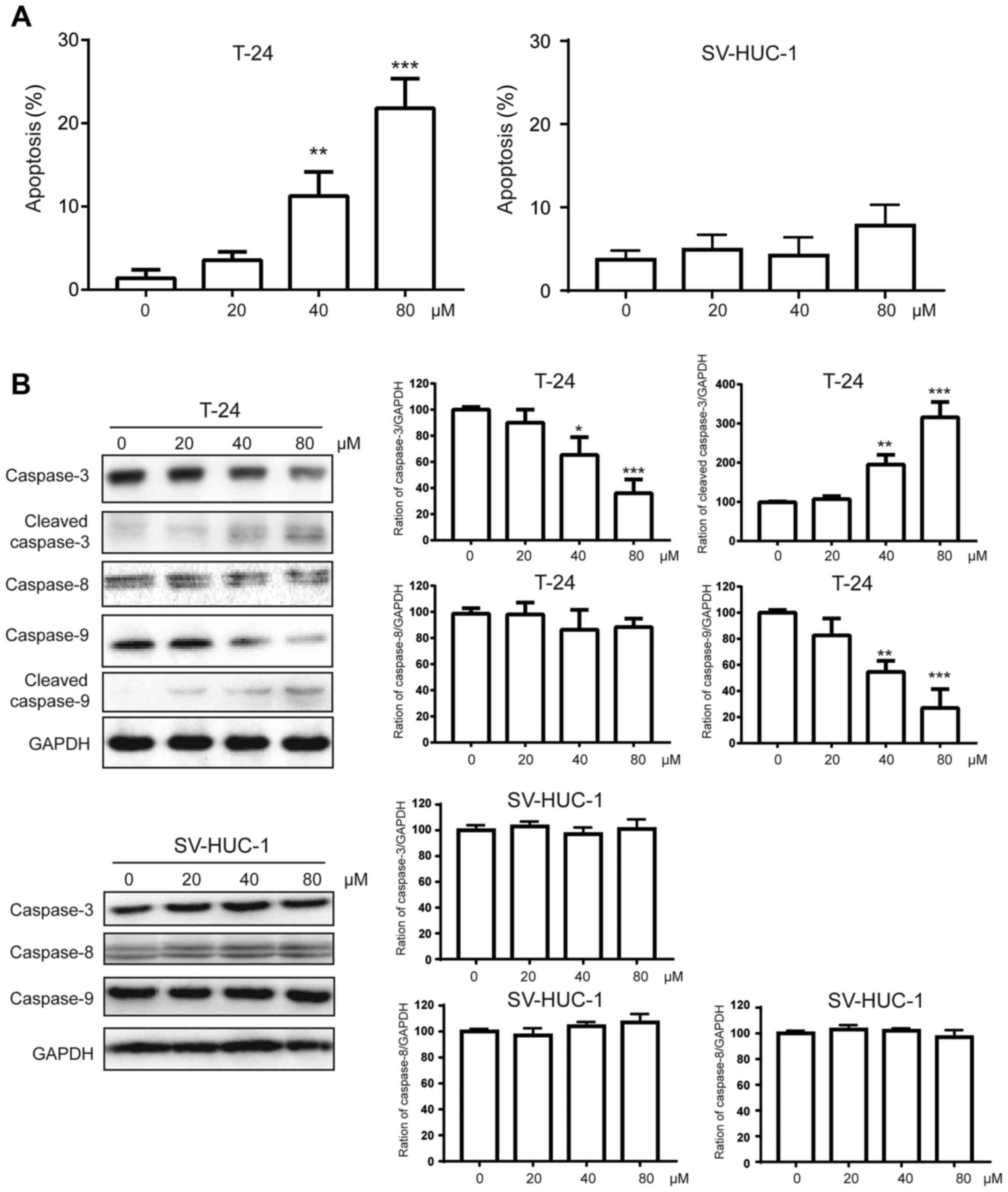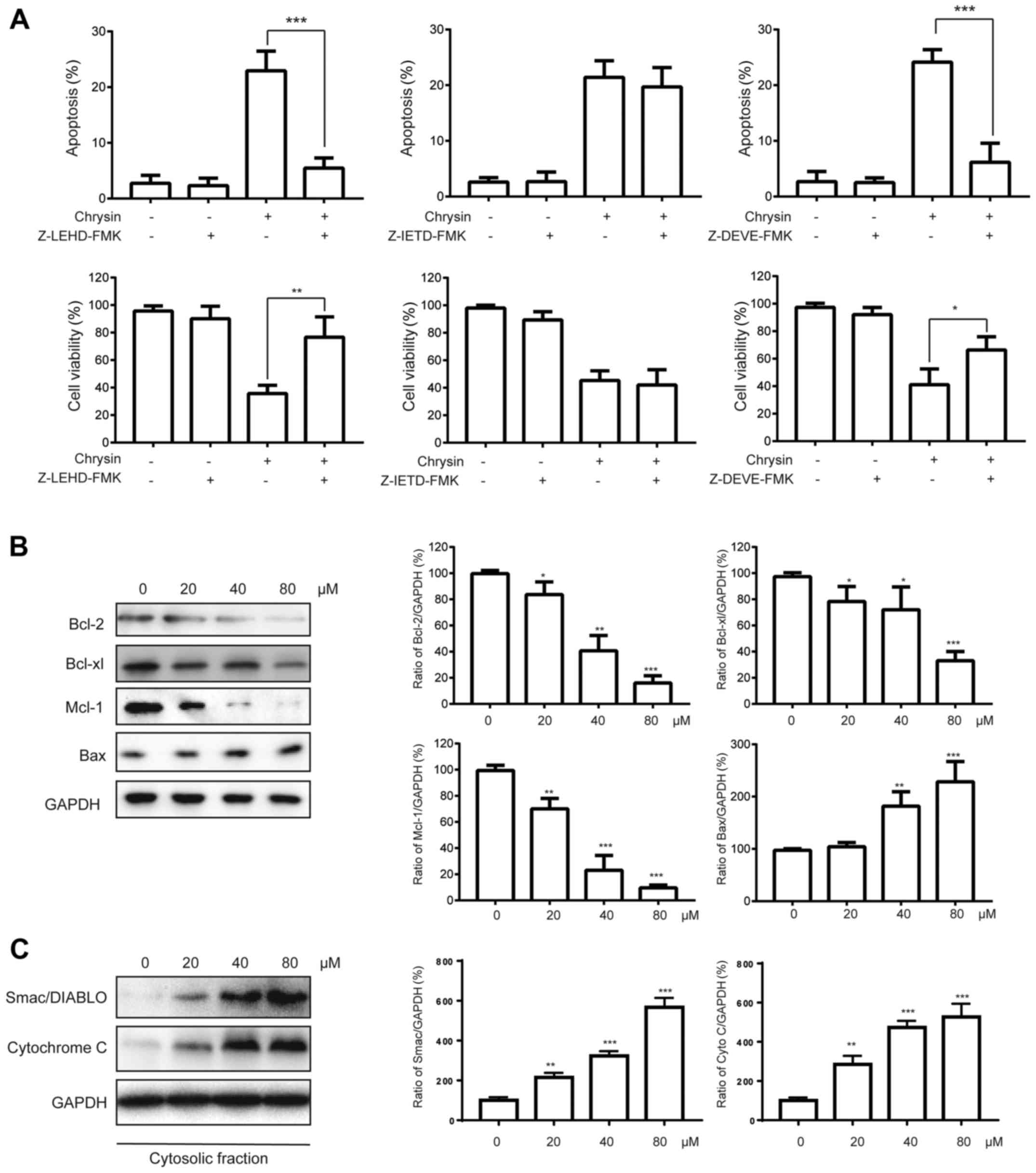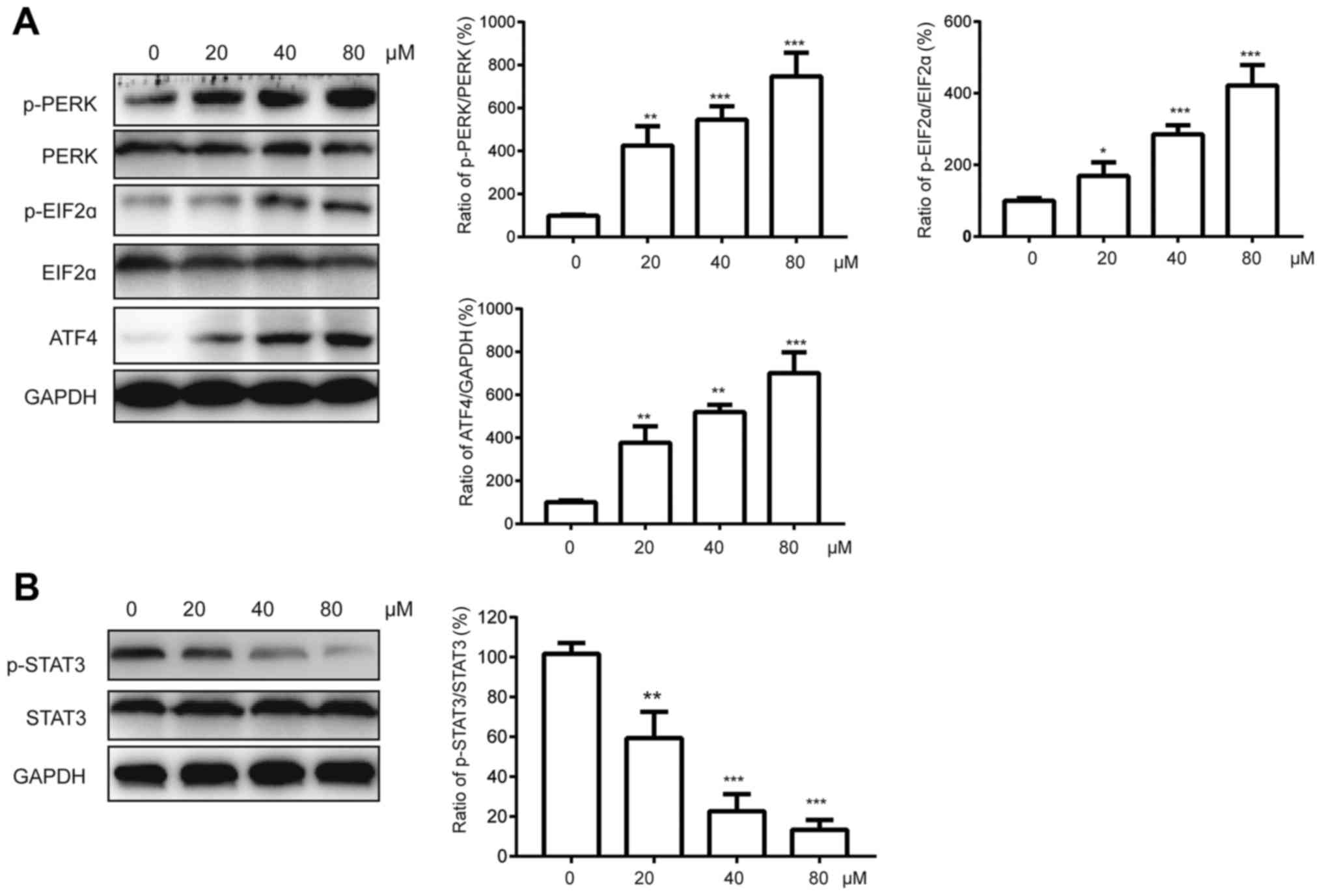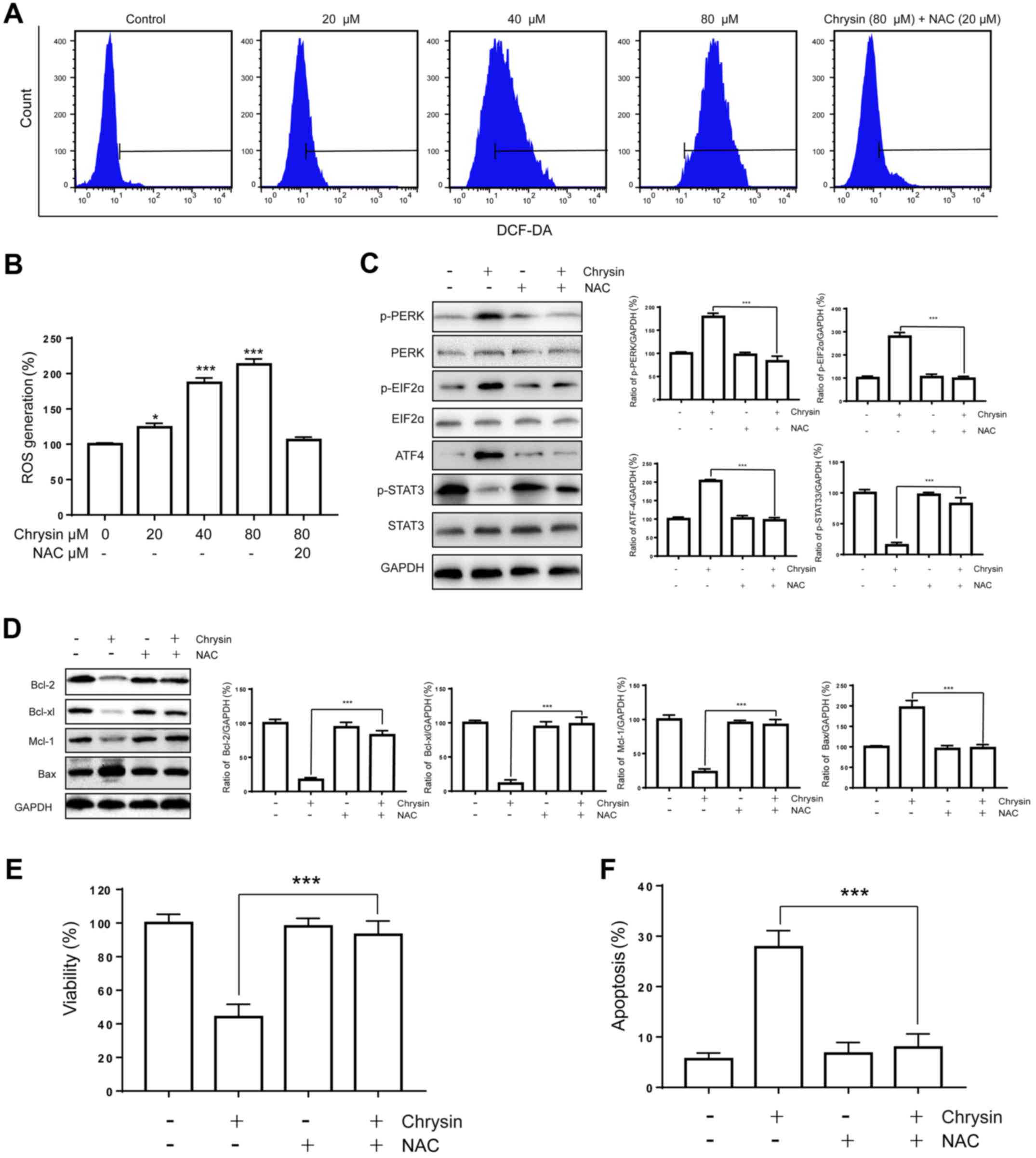|
1
|
Siegel RL, Miller KD and Jemal A: Cancer
statistics, 2016. CA Cancer J Clin. 66:7–30. 2016. View Article : Google Scholar : PubMed/NCBI
|
|
2
|
Arantes-Rodrigues R, Pinto-Leite R,
Fidalgo-Goncalves L, Palmeira C, Santos L, Colaço A and Oliveira P:
Synergistic effect between cisplatin and sunitinib malate on human
urinary bladder-cancer cell lines. Biomed Res Int. 2013:7914062013.
View Article : Google Scholar : PubMed/NCBI
|
|
3
|
Nguyen DP and Thalmann GN: Contemporary
update on neoadjuvant therapy for bladder cancer. Nat Rev Urol.
14:348–358. 2017. View Article : Google Scholar : PubMed/NCBI
|
|
4
|
Pratheeshkumar P, Son YO, Korangath P,
Manu KA and Siveen KS: Phytochemicals in cancer prevention and
therapy. Biomed Res Int. 2015:3240212015. View Article : Google Scholar : PubMed/NCBI
|
|
5
|
Parajuli P, Joshee N, Rimando AM, Mittal S
and Yadav AK: In vitro antitumor mechanisms of various Scutellaria
extracts and constituent flavonoids. Planta Med. 75:41–48. 2009.
View Article : Google Scholar : PubMed/NCBI
|
|
6
|
Gresa-Arribas N, Serratosa J, Saura J and
Sola C: Inhibition of CCAAT/enhancer binding protein delta
expression by chrysin in microglial cells results in
anti-inflammatory and neuroprotective effects. J Neurochem.
115:526–536. 2010. View Article : Google Scholar : PubMed/NCBI
|
|
7
|
Torres-Piedra M, Ortiz-Andrade R,
Villalobos-Molina R, Singh N, Medina-Franco JL, Webster SP, Binnie
M, Navarrete-Vázquez G and Estrada-Soto S: A comparative study of
flavonoid analogues on streptozotocin-nicotinamide induced diabetic
rats: Quercetin as a potential antidiabetic agent acting via
11beta-hydroxysteroid dehydrogenase type 1 inhibition. European
journal of medicinal chemistry. 45:2606–2612. 2010. View Article : Google Scholar : PubMed/NCBI
|
|
8
|
Wang J, Qiu J, Dong J, Li H, Luo M, Dai X,
Zhang Y, Leng B, Niu X, Zhao S and Deng X: Chrysin protects mice
from staphylococcus aureus pneumonia. J Appl Microbiol.
111:1551–1558. 2011. View Article : Google Scholar : PubMed/NCBI
|
|
9
|
Du Q, Gu X, Cai J, Huang M and Su M:
Chrysin attenuates allergic airway inflammation by modulating the
transcription factors T-bet and GATA-3 in mice. Mol Med Rep.
6:100–104. 2012.PubMed/NCBI
|
|
10
|
Huang C, Wei YX, Shen MC, Tu YH, Wang CC
and Huang HC: Chrysin, abundant in morinda citrifolia fruit
water-etoac extracts, combined with apigenin synergistically
induced apoptosis and inhibited migration in human breast and liver
cancer cells. J Agric Food Chem. 64:4235–4245. 2016. View Article : Google Scholar : PubMed/NCBI
|
|
11
|
Kasala ER, Bodduluru LN, Madana RMVAK,
Gogoi R and Barua CC: Chemopreventive and therapeutic potential of
chrysin in cancer: Mechanistic perspectives. Toxicol Lett.
233:214–225. 2015. View Article : Google Scholar : PubMed/NCBI
|
|
12
|
Yu R, Deedigan L, Albarenque SM, Mohr A
and Zwacka RM: Delivery of sTRAIL variants by MSCs in combination
with cytotoxic drug treatment leads to p53-independent enhanced
antitumor effects. Cell Death Dis. 4:e5032013. View Article : Google Scholar : PubMed/NCBI
|
|
13
|
Baig S, Seevasant I, Mohamad J, Mukheem A,
Huri HZ and Kamarul T: Potential of apoptotic pathway-targeted
cancer therapeutic research: Where do we stand? Cell Death Dis.
7:e20582016. View Article : Google Scholar : PubMed/NCBI
|
|
14
|
Singh MP, Han J and Kang SC:
3′,5-dihydroxy-3,4′,7-trimethoxyflavone-induces
ER-stress-associated HCT-116 programmed cell death via redox
signaling. Biomed Pharmacothe. 88:151–161. 2017. View Article : Google Scholar
|
|
15
|
Lin CC, Kuo CL, Lee MH, Lai KC, Lin JP,
Yang JS, Yu CS, Lu CC, Chiang JH, Chueh FS and Chung JG: Wogonin
triggers apoptosis in human osteosarcoma U-2 OS cells through the
endoplasmic reticulum stress, mitochondrial dysfunction and
caspase-3-dependent signaling pathways. Int J Oncol. 39:217–224.
2011.PubMed/NCBI
|
|
16
|
Bhardwaj M, Kim NH, Paul S, Jakhar R, Han
J and Kang SC: 5-hydroxy-7-methoxyflavone triggers
mitochondrial-associated cell death via reactive oxygen species
signaling in human colon carcinoma cells. PloS one.
11:e01545252016. View Article : Google Scholar : PubMed/NCBI
|
|
17
|
Harding HP, Zhang Y and Ron D: Protein
translation and folding are coupled by an
endoplasmic-reticulum-resident kinase. Nature. 397:271–274. 1999.
View Article : Google Scholar : PubMed/NCBI
|
|
18
|
Shi Y, Vattem KM, Sood R, An J, Liang J,
Stramm L and Wek RC: Identification and characterization of
pancreatic eukaryotic initiation factor 2 alpha-subunit kinase,
PEK, involved in translational control. Mol Cell Biol.
18:7499–7509. 1998. View Article : Google Scholar : PubMed/NCBI
|
|
19
|
Harding HP, Zhang Y, Zeng H, Novoa I, Lu
PD, Calfon M, Sadri N, Yun C, Popko B, Paules R, et al: An
integrated stress response regulates amino acid metabolism and
resistance to oxidative stress. Molecular cell. 11:619–633. 2003.
View Article : Google Scholar : PubMed/NCBI
|
|
20
|
Aggarwal BB and Shishodia S: Molecular
targets of dietary agents for prevention and therapy of cancer.
Biochem Pharmacol. 71:1397–1421. 2006. View Article : Google Scholar : PubMed/NCBI
|
|
21
|
Yu R, Yu BX, Chen JF, Lv XY, Yan ZJ, Cheng
Y and Ma Q: Anti-tumor effects of Atractylenolide I on bladder
cancer cells. J Exp Clin Cancer Res. 35:402016. View Article : Google Scholar : PubMed/NCBI
|
|
22
|
Tong QS, Zheng LD, Lu P, Jiang FC, Chen
FM, Zeng FQ, Wang L and Dong JH: Apoptosis-inducing effects of
curcumin derivatives in human bladder cancer cells. Anticancer
Drugs. 17:279–287. 2006. View Article : Google Scholar : PubMed/NCBI
|
|
23
|
Su Q, Peng M, Zhang Y, Xu W, Darko KO, Tao
T, Huang Y, Tao X and Yang X: Quercetin induces bladder cancer
cells apoptosis by activation of AMPK signaling pathway. Am J
Cancer Res. 6:498–508. 2016.PubMed/NCBI
|
|
24
|
Park HY, Kim GY, Moon SK, Kim WJ, Yoo YH
and Choi YH: Fucoidan inhibits the proliferation of human urinary
bladder cancer T24 cells by blocking cell cycle progression and
inducing apoptosis. Molecules. 19:5981–5998. 2014. View Article : Google Scholar : PubMed/NCBI
|
|
25
|
Zhang S, Yang X and Morris ME: Flavonoids
are inhibitors of breast cancer resistance protein (ABCG2)-mediated
transport. Mol Pharmacol. 65:1208–1216. 2004. View Article : Google Scholar : PubMed/NCBI
|
|
26
|
Cardenas M, Marder M, Blank VC and Roguin
LP: Antitumor activity of some natural flavonoids and synthetic
derivatives on various human and murine cancer cell lines. Bioorg
Med Chem. 14:2966–2971. 2006. View Article : Google Scholar : PubMed/NCBI
|
|
27
|
Samarghandian S, Nezhad MA and Mohammadi
G: Role of caspases, Bax and Bcl-2 in chrysin-induced apoptosis in
the A549 human lung adenocarcinoma epithelial cells. Anticancer
Agents Med Chem. 14:901–909. 2014. View Article : Google Scholar : PubMed/NCBI
|
|
28
|
Zhang Q, Ma S, Liu B, Liu J, Zhu R and Li
M: Chrysin induces cell apoptosis via activation of the
p53/Bcl-2/caspase-9 pathway in hepatocellular carcinoma cells. Exp
Ther Med. 12:469–474. 2016. View Article : Google Scholar : PubMed/NCBI
|
|
29
|
Srivastava S, Somasagara RR, Hegde M,
Nishana M, Tadi SK, Srivastava M, Choudhary B and Raghavan SC:
Quercetin, a natural flavonoid interacts with dna, arrests cell
cycle and causes tumor regression by activating mitochondrial
pathway of apoptosis. Sci Rep. 6:240492016. View Article : Google Scholar : PubMed/NCBI
|
|
30
|
Ramirez-Tagle R, Escobar CA, Romero V,
Montorfano I, Armisén R, Borgna V, Jeldes E, Pizarro L, Simon F and
Echeverria C: Chalcone-induced apoptosis through caspase-dependent
intrinsic pathways in human hepatocellular carcinoma cells. Int J
Mol Sci. 17:2602016. View Article : Google Scholar : PubMed/NCBI
|
|
31
|
Wu D, Zhang J, Wang J, Li J, Liao F and
Dong W: Hesperetin induces apoptosis of esophageal cancer cells via
mitochondrial pathway mediated by the increased intracellular
reactive oxygen species. Tumour Biol. 37:3451–3459. 2016.
View Article : Google Scholar : PubMed/NCBI
|
|
32
|
Ryu S, Lim W, Bazer FW and Song G: Chrysin
induces death of prostate cancer cells by inducing ROS and ER
stress. J Cell Physiol. 232:3786–3797. 2017. View Article : Google Scholar : PubMed/NCBI
|
|
33
|
Yu H, Lee H, Herrmann A, Buettner R and
Jove R: Revisiting STAT3 signalling in cancer: New and unexpected
biological functions. Nat Rev Cancer. 14:736–746. 2014. View Article : Google Scholar : PubMed/NCBI
|
|
34
|
Lirdprapamongkol K, Sakurai H, Abdelhamed
S, Yokoyama S, Athikomkulchai S, Viriyaroj A, Awale S, Ruchirawat
S, Svasti J and Saiki I: Chrysin overcomes TRAIL resistance of
cancer cells through Mcl-1 downregulation by inhibiting STAT3
phosphorylation. Int J Oncol. 43:329–337. 2013. View Article : Google Scholar : PubMed/NCBI
|
|
35
|
Redza-Dutordoir M and Averill-Bates DA:
Activation of apoptosis signalling pathways by reactive oxygen
species. Biochim Biophys Acta. 1863:2977–2992. 2016. View Article : Google Scholar : PubMed/NCBI
|
|
36
|
Moloney JN and Cotter TG: ROS signalling
in the biology of cancer. Semin Cell Dev Biol. 30383–30384.
2017.
|
|
37
|
Choi EO, Park C, Hwang HJ, Hong SH, Kim
GY, Cho EJ, Kim WJ and Choi YH: Baicalein induces apoptosis via
ROS-dependent activation of caspases in human bladder cancer 5637
cells. Int J Oncol. 49:1009–1018. 2016. View Article : Google Scholar : PubMed/NCBI
|
|
38
|
Rasul A, Bao R, Malhi M, Zhao B, Tsuji I,
Li J and Li X: Induction of apoptosis by costunolide in bladder
cancer cells is mediated through ROS generation and mitochondrial
dysfunction. Molecules. 18:1418–1433. 2013. View Article : Google Scholar : PubMed/NCBI
|
|
39
|
Jeong JW, Lee WS, Go SI, Nagappan A, Baek
JY, Lee JD, Lee SJ, Park C, Kim GY and Kim HJ: Pachymic acid
induces apoptosis of EJ bladder cancer cells by DR5 Up-regulation,
ROS generation, modulation of Bcl-2 and IAP family members.
Phytother Res. 29:1516–1524. 2015. View
Article : Google Scholar : PubMed/NCBI
|















